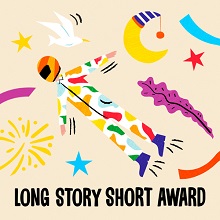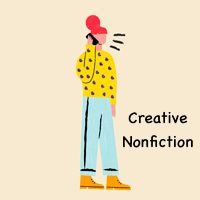"Are you scared?" I ask Dad over the phone.
"What do I have to be scared about?" he says. "We're locked in our rooms."
He's always been tough like that, stoic, but I wish I could see his face, hug
...
[+]
Milquetoast and the Abstract Space Between Lust and Love
He and I had been doing this dance all semester: we would yell at each other above the noise of whatever song was playing in that small and dirty house, drinks in our hands, with the implicit awareness that I had a longtime crush on his friend and he had a crush on me. Somewhere in between my disappointment at not catching the eye of my intended target, and his alcohol-induced attraction to me, we ended up sitting on the back stoop of the duplex, folded up against each other and breathless. It had rained earlier that day, but had spared us the night.
“What does that word mean—milquetoast?” I rolled it around on my tongue, with a tipsy laugh and a light touch on his arm. I am well aware of what it takes to fit a fantasy. “It’s...you’re just so real,” he said, “you’re not like the rest.” Well, I am certainly not made of plastic, I thought. I abruptly stopped a few paces behind him and peered curiously up at his face, bluntly phrasing a question like a statement: “are you into me?” The gravity of explicitly stating our feelings feels like uncharted territory and keeps us using culturally coded euphemisms, purposefully leaving room for misinterpretation that works in our favor. “I am very attracted to your body,” objectifies too much, however often it may be true. “I think I could love you,” is too serious. He never actually answered my question, but perhaps that was an answer in and of itself. We arrived at the shoebox that was my room, and climbed into my bed in between kisses. My roommate at the time had a hamster that incessantly exercised its right to use its creaky wheel at night, which never bothered me, but he noticed: “Damn, that’s loud.” We laughed nervously, unsure of who would command the situation. His hands gravitated toward the zipper of my jeans.“Not tonight,” I whispered, apologetic but firm. There is something so tenderly intimate about breathing so close to someone who wants your body, but is willing to hold you at arm’s length for your own sake. The feeling of being wanted for the entirety of what you are, when you don’t even know if you want dinner, is like a drug. We spent the early morning hours tracing each other's faces, exchanging small secrets, before we had to think about interacting in the light of day.
After he left my bed that morning, I sat uncomfortably with the combined relief that he had gone and the unwelcome but expected knowledge that I missed him, or at least the warmth of his body under mine. Somewhere in the midst of sifting through the personal consequences of my actions, I remembered that I had wanted to look up that odd word: milquetoast. I first typed “milktoast” into my dying laptop, generating recipes for a New England staple meal of toasted bread in warm milk, typically paired with sugar and butter. After a little more digging, I teased out the American English slang reference to Caspar Milquetoast, a comic strip character developed by H. T. Webster from his 1924 series The Timid Soul for a New York City newspaper. Mr. Milquetoast is described as “the man who speaks softly and gets hit with a big stick,” and was indeed derived from the beloved bland food itself, suitable for those who are quick to nausea. Urban Dictionary defines it as “a weak, spineless individual who is basically the world’s floor-mat.” I smiled briefly, wondering if I deserved such a distinction.
I find it comical and alarming that in the year 2020, science is not yet advanced enough to have bottled a simulated version of what love feels like. Literature makes valiant attempts to provide accurate descriptions of what it’s like to abandon instinctual rationality just to feel wanted. I have lusted over many people, even loved some, but most trouble lies in the space between the two. They say you cannot control who you love, but I am not convinced. Loving someone, really loving them, takes patience, fighting after the rose-colored glasses come off and all that’s left is stains on underwear and routine sex on Friday nights. It is deliberate and calculated. Lust is something different altogether: I never feel more primal than when I am using someone else’s body with the knowledge that they are using mine. Whenever I trespass on that immoral ground that I know is not supposed to feel immoral, I shake hands with the darker, more carnal pieces of myself. There are people, however, that enter the otherwise calm landscape of our lives, without our permission, without our knowing. We want their bodies, yes, but we also want everything they are. We could love them, and something unknown whispers this in our ears, in our hearts. I suppose this is where the phrase, “the heart wants what the heart wants,” comes from.
Fearlessness is a myth—there is only courage. My high school English teacher once told our eager senior class that, contrary to popular graduation rhetoric, we were never the star of our own show. The world does not revolve around us. People, relationships, and our own emotions hang in the balance when we forge ahead to “figure ourselves out.” I am simultaneously comforted that self discovery is still a mysterious pursuit with no finite beginning or end, and terrified that I cannot intellectualize every emotional nuance that is not readily explained.
I have a soft spot in my heart for Mr. Milquetoast, and others who have fallen under the same title. Too often we unknowingly construct false, more likeable versions of ourselves to fill whatever mold we see fit: the one that pleases the most people, the one that is least disagreeable, the one that is not subject to pain. If our false selves fall in love with other false selves, will truth ever exist? I admire those who shrug off criticism, who bask in their exposure to the elements of life. If you avoid the worst of yourself, you will never see the best. I live a life with the highest of highs and the lowest of lows, and I refuse to do otherwise. It never gets easier to dive headfirst into what you fear, and if it did, I wouldn’t be writing this. I perform the delicate act of holding hurt and hope in the same moment. I can be very beautiful, and also very disgusting. I have the capacity to be very despicable, but often quite lovable. No, I am in fact, not milquetoast. And yet, sometimes I am.



